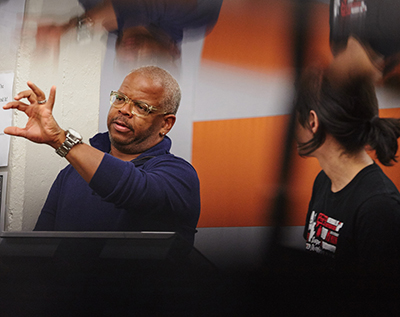
Terence Blanchard
Terence Blanchard is jazz royalty—trumpeter, bandleader, film score composer, and recording artist. His ties to Berklee revolve around teaching and mentoring rather than as an alumnus, but he has said that “coming to Berklee feels like I’m coming home,” remarking that he always learns so much while here. In 2015 he was named a visiting scholar in the Jazz Composition Department and also in the Film Scoring and Brass departments. In April 2016, Blanchard participated in Berklee’s State of Jazz Composition Symposium, speaking on Afro-Latin rhythm and jazz compositional perspectives.
Blanchard, who has won five Grammys, was born in New Orleans, Louisiana, in 1962. He began playing the piano at age 5 and switched to trumpet at age 8. While studying at Rutgers University in New Jersey, he toured with the Lionel Hampton Orchestra, eventually replacing Wynton Marsalis.
In the early ‘90s, Blanchard gained attention as a soloist, performing on Spike Lee’s Do the Right Thing and Mo’ Better Blues. He went on to score all of Lee’s subsequent films, including the Hurricane Katrina documentary, When the Levees Broke. Produced by Columbia, Sony, and now Blue Note, his 20 albums include Breathless (2015) with his band, E-Collective; Bounce (2003); and Flow (2005), among many others. He has continued to score films and write and score operas and plays, including Champion, about prize fighter Emile Griffin, who killed a man in the ring.
Blanchard is known for his collaborative work, from serving as artistic director for the Thelonius Monk Institute of Jazz at University of Southern California in Los Angeles to working with such musicians as Stevie Wonder, Herbie Hancock, and the Olympia Brass Band, among others.
For Blanchard, who lives in New Orleans with his wife and four children, the life of jazz follows the Berklee model: learning as a lifelong pursuit.